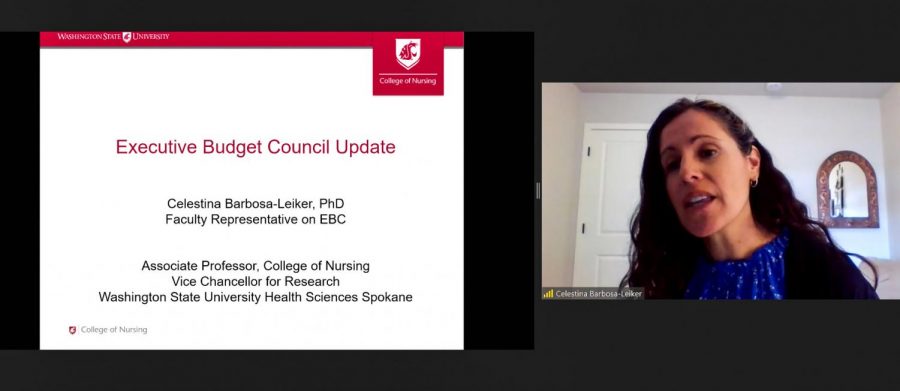- Administration
- COVID-19
- Faculty
- News
- Pullman Community
- WSU Everett
- WSU Pullman campus
- WSU Spokane
- WSU Tri-Cities
- WSU Vancouver
Legislative representative reports to Faculty Senate
Governor’s proposed budget could require furloughs, canceled university pay raises
The WSU Executive Budget Council plans to create a new budget model. The process will bring in stakeholders, like faculty and staff, to evaluate current budget-planning methods then adapt them to better suit university needs.
March 5, 2021
Faculty senators heard from guest speakers about legislative progress for WSU-specific House Bills, as well as updates from the Executive Budget Council during a meeting Thursday afternoon.
Stephen Bollens, WSU Faculty Senate legislative representative, outlined the impacts Gov. Jay Inslee’s 2021-2023 proposed budget could have for WSU.
Within the proposal, all capital budget requests for WSU, including projects aimed to create jobs, would be fully funded, he said. Diversity, equity and inclusion initiatives would be implemented for four Washington institutions, such as WSU and Central Washington University.
On the other hand, Bollens said Inslee’s plan would require 24 days of faculty and staff furloughs for the 2021-2023 biennium, as well as repealing a scheduled 3 percent wage increase for government employees.
He said a $1.9 trillion COVID-19 stimulus package, referred to as the American Rescue Plan, would grant Washington state $6.72 billion. The House approved the package Feb. 27, and if accepted by the Senate, could have final approval by mid-March.
Funds would be split between state, county and city governments with about 63 percent going to the state and 37 percent toward cities and counties in Washington, Bollens said.
“If this were to come to pass, it would just totally change the state’s budget outlook from deficit to surplus,” he said.
Legislative priorities specific to WSU include passing an operating budget request to avoid new furloughs and the repeal of last year’s raises, Bollens said.
In addition, Bollens said he advocated for House Bill 1051, which would create a faculty member position on the Board of Regents for WSU and University of Washington.
The bill passed in the House College and Workforce Development Committee and the House Rules Committee. Bollens said he expects it will be voted on the House floor soon.
Faculty Senate also heard from Celestina Barbosa-Leiker, WSU Executive Budget Council representative and WSU associate professor.
The EBC plans to create a new budget model as part of the updated WSU system strategic plan and One WSU system, she said.
The process will bring in stakeholders, like faculty and staff, to evaluate current budget-planning methods then adapt them to better suit university needs, Barbosa-Leiker said. The council will also look at other successful university budget models.
After interviews with community members, she said it was apparent there is a need for more transparency about budget decisions, as well as a shift away from a “competitive culture.”
Barbosa-Leiker said WSU across all campuses has a mentality of competing for students and resources, rather than collaborating.
“Culture eats strategy for breakfast,” she said. “The culture within the university is way more important than any strategic plan that you can put out there.”
Senator Von Walden asked if councilmembers were aware of the gender disparities at WSU identified in a May 2020 study by School of Economic Sciences faculty Jill McCluskey and Joshua Tibbitts.
Statistics from the study showed a gender gap for salaries and promotion at WSU, equating to career-track women earning 6.4 percent less than men.
Barbosa-Leiker said the issue has not been brought up yet because the council is working on general guiding principles as opposed to acute topics.
“I think much more attention needs to be paid to that study,” she said. “We need to embed an evaluative process to make sure that never occurs again in the future. If we can embed that in a new budget model, I think that’s how we can bring it within the EBC.”
The council plans to have a report summarizing its findings by May, Barbosa-Leiker said.










